Baseball, Movies, America—Pros and Cons
An interview with Noah Gittell about his new book Baseball: The Movie
Noah Gittell is one of my favorite film critics; he’s thoughtful, passionate, and loves the medium enough to criticize it and appreciate it without descending into unquestioning reverence. His new book, Baseball: The Movie, available for preorder and released later this month, demonstrates all of his virtues. It’s an exhaustive study of the baseball movie from the post-war era to the present, and while it’s enthusiastic about both baseball and movies, it doesn’t hesitate to talk about the failures and blindspots of both. Even for someone like me, who doesn’t care at all about baseball and hate movies, the book was thoroughly enjoyable and enlightening.
I talked to Noah on the phone about baseball, America, racism in both, and the greatest baseball movie ever. The transcript below has been lightly edited for clarity and length.
Noah Berlatsky: Reading your book, you get the impression that you know, everything there is to know about baseball and movies and how they intersect. How did you come to these topics? It seems like a lifelong interest.
Noah Gittell: Well, I think initially, both baseball and movies were childhood passions of mine. And they were an escape for me from stressors or childhood difficulties in the home, that sort of thing.
I fell in love with baseball when I was six years old. And I fell in love with movies shortly thereafter. And it was a great time to be a fan of those things, because it was during the baseball movies boom of the 80s and early 90s.
How old are you?
I'm 44. Born in 1980.
And the baseball movie, it really works in tandem with the sport itself. Because when you’re a fan of the sport, you never really get to know the players involved. And the baseball movies fills in the gaps, it shows you what you imagine these people go through and what it means to be a baseball player and what it means to play this sport. So as I was growing up as a fan of the game, the baseball movie really supported that burgeoning fandom. And it was a great time to have that experience, because there were so many great baseball movies.
In the book you talk about baseball being especially cinematic and about it being especially Hollywood. Are those the same thing?
I don't think they're exactly the same thing, but I think there's some overlap.
When I say that baseball's cinematic, what I mean is that it lends itself to film more than other sports, because of the three-dimensional elements of the game. You know, you've got the ball sort of ping ponging in different directions quite a lot in the game.
And also, I think it lends itself to understanding who the characters are who are playing in the game because they are standing still. They are not wearing helmets that cover their faces, and that makes it more cinematic.
And I also think that there is something really fundamental about the confrontational aspect of the game. It is a game of individual confrontations. It's a team sport, but the individual part of it is really elemental. So when you have a pitcher, staring at a catcher, and you’ve got a batter staring back—it almost feels like a Western. It feels like there's a dual going on. And I think that individual confrontation is something that is really fundamental to Hollywood cinema. And baseball lends itself to that more than any other sport.
You talk about baseball films as validating some American ideas about optimism, hard work meritocracy, personal sacrifice. How do the films do that? And is that a good thing? Are there downsides?
Yeah, that's a big question.
I do think baseball films, especially in the post war era, which is where I start my book, —baseball was used in those films as a symbol of everything that was right with a vision of postwar America. America was democratic, and if you have the talent and the drive, you can have everything you want in life, you can get a beautiful wife, you can have a great job, you can be adored by millions. And if you're Lou Gehrig in Pride of the Yankees (1942) you could die the most dignified death possible. And that was really all anyone asked for at that time.
Over the years, though, I think baseball has been used to reflect various changes in American culture. You have films, in the 1970s, that were much more dour, and with a spirit of defeatism that I think you didn't see, in earlier years. In the 80s, you had a lot of movies reflecting Reaganism’s nostalgia. That was quite pernicious in some of those films, like The Natural (1984) and Field of Dreams (1989).
and then I think in the 2000s, in the Obama era, you saw certain baseball films trying to dig deep and expand the circle of compassion a little bit and find new types of archetypes. So I think just because baseball is the national game, it lends itself to being used as a metaphor for American values. And that can be a good thing. It can be a bad thing. It lends itself to propaganda, for sure. But it also offers an opportunity to dig deep and say meaningful things about the character of the nation.
So what would be a film that talks about the American character in interesting ways?
I would say The Bingo Long Traveling All-Stars & Motor Kings is a pretty good example.
This was a film about the Negro Leagues that came out in 1976. And before it, there was really only one film that dealt with baseball's race problem. And that was The Jackie Robinson Story in 1950. That film was pure propaganda. It was propaganda for integration, because baseball wasn't fully integrated yet. At that point, there were only a few black players, and they wanted to paint Jackie Robinson as just a saint with no dimension, beyond having preternatural restraints. And they didn't get into all the complexities of what integration meant for the Negro Leagues, how it really affected players.
Bingo Long, which is about a barnstorming team that emerged from the Negro Leagues is very forward about economics and about race. That is a movie that could never have been made in the post war era. But it was made in the 1970s, when I would say illusions about America were at an all-time low, and perhaps the public was ready for some more kind of hard hitting look at race in America.
You talk about Bingo in the book, but you also argue that there hasn't really been a great Hollywood baseball movie about race and racism. Why isn’t Bingo that movie, and why hasn’t that movie been made?
For all that Bingo does right, it has a lot of problems as well. It was made by white people. And I think you can see that in the film. Because while it addresses certain topics, and it shows certain sides of life for Black players that were previously hidden, it also shies away from the hardest realities. It doesn't really contain the lives and experiences of Black players.
And I'm not sure any film that has ever been made, at least by the studios ever has. There have been some smaller films. There’s an HBO film called Soul of the Game (1996), about Satchel Paige and Josh Gibson and Jackie Robinson, which really addresses how integration, while a beneficial thing overall for baseball, decimated the Negro Leagues and really destroyed part of Black culture in this country. But that is an HBO original film that never made it to theatres.
Baseball still has a race problem and Hollywood still has a race problem. So when you try to put those two things together and tell an honest story about race in baseball through Hollywood, it's very hard to make that happen.
And I think the best example of that, which I mentioned in the book is that Spike Lee had a really good script about Jackie Robinson that he wanted to get made. And he had Denzel Washington in the mid 1990s on board to play Jackie. But he couldn't get financing for it. And by the time he finally got financing for it, Denzel had aged out of the role, and the whole thing fell apart. So, if Spike and Denzel can't get a good movie about race in baseball made…
That was 30 years ago, though. And Hollywood seems to have made some progress in other genres. Horror film has been pretty racist for a really long time, but Jordan Peele made Get Out and its success led to some change. Superhero movies have lots of problems, but Black Panther was a hit which addressed racism, not perfectly, but in ways that were pretty thoughtful. Is there something about baseball movies in particular, that makes addressing racism more difficult?
Well, I think there are two things. Number one is that baseball movies in general just aren't being made very much right now.
Part of the reason for that is that a lot of mid-budgeted movies aren't getting made right now and are going to television instead, and that has happened with baseball movies as well.
But also I think baseball movies and movies about Black characters have both historically been labeled with the same affliction, which is that they are thought to not perform well outside of the United States.
And it took a lot of effort, a lot of time for movies about black characters to overcome that stigma. I think it probably wasn't until Black Panther that people really kind of said, “Okay, well, maybe it’s not true that they won’t sell overseas.”
For the baseball movie, it's been similar. Outside of Field of Dreams and Moneyball (2011), very few baseball movies have even gotten that international release, let alone made money internationally, because it was thought that baseball movies didn't have an audience outside of the US.
So when you put the baseball movie and movies about Black characters together, I think that it's very frightening to studio executives who say, “This is only going to play in the United States.” And of course, now more than ever, the international box office is a big part of the overall calculation for studios.
In the book you talk about the fact that the audience for baseball movies at this point is often conservative. Most baseball movies today are being made for Christian or faith-based audiences.
Yeah, I think that's true. I mean, the only baseball movie that has gotten anything close to a wide release in the last 10 years is this film that came out last year, called The Hill with Dennis Quaid. It was in 1500 theaters, and it made a decent amount of money. And it's a Christian baseball movie about a physically disabled kid who overcomes his struggles and becomes a professional ballplayer.
And that came on the heels of, you know, 10 or15 years of baseball movies that went straight to the Pure Flix streaming service or straight to the Walmart DVD bin, but were being seen and bought by a lot of Christians, a lot of evangelicals.
The interesting thing about these films is that in spirit, they're not that different from the original post-war mainstream baseball movies. They’re wholesome, they're about overcoming the odds, and they all take place in rural settings for the most part. But those ideals that were propagated as mainstream in the post war era are now part of the Christian right. And I think that's an interesting thing to look at in terms of how those values have shifted over the years, at least when it comes to baseball.
One interesting film about racism you talk about is Sugar, an independent film from 2008 about a player from the Dominican Republic. Could you talk about what makes that film interesting?
Sugar does a lot of things that other baseball movies don't do. There aren't a lot of movies that focus on a minor leaguer. There are even fewer that focused on a Latino minor leaguer, Latinos, of course make up increasingly large percentage of Major League players. And there are even fewer—in fact, there's only one!—movie that features a Latino minor leaguer who decides he’s better off without being a professional baseball player.
And I think that makes Sugar incredibly subversive. Most Dominican players who are signed by major league teams come to the US. And most of them don't make the majors. There's about a 35% success rate just for playing one day in the major leagues. So most of them end up more like like the character in this movie, who has a brief run of success in the minors and who struggles.
And he doesn't just struggle with the game. He struggles with being somebody who doesn't speak the language who doesn't have any friends. And he doesn't know how to even order breakfast for himself at a diner. The film is more an immigrant movie than a baseball movie, I think. But it's the mashup of those two things that makes it so radical, because baseball movies don't talk about failure, unless it's a step on the way to success.
And this is a movie about a guy who, you know, many people would say that he fails. But it reframes his journey as something positive, because he decides baseball is not for him. And he carves out another life in America that is more meaningful. A life where he doesn't feel the pressure of performing and where he doesn't feel like a stranger in a strange land because he eventually finds himself in its admitted community.
And these are stories, as I say, the Major League Baseball doesn't want told, they don't want to think about the people who don't make it, because then they have to ask a lot of questions about, you know, are we are pilfering a developing nation? Are we taking care of people the way they should be taken care of when we're employing them? And they only want us to think about the guys who make the majors, Hall of Famers. But there are way more guys like Sugar. And they deserve to have their stories told.
He's an undocumented immigrant too, by the end of the film, right? Because he comes over on a work visa, and then he leaves his job but stays in the US.
Yes. He becomes undocumented, he moves to New York and becomes part of the Dominican community there living as an undocumented immigrant.
The politics of that are not discussed in the movie, but it's quite clear. I mean, this is a movie that came out in 2009, was made in 2008, at a time when candidate Obama was talking very big about immigration, and I think everyone hoped that his election would be a rising tide that lifted all boats. But there were pretty significant failures on the immigration issue under Obama. And I think this movie is a really interesting snapshot of a hopeful time, when we thought that somebody like Sugar could find a home for himself here. And in that way, this is a very much an Obama era movie. But I think its optimism seems a little naive in retrospect.
So what is your favorite baseball film? Or which do you think is the best?
Well, best and favorite is something I struggle with my life as a critic. But I will say the movie that I can watch over and over and over and over again, is A League of Their Own (1992).
There's a few different reasons for that. I mean, I think it's a great baseball movie. Baseball drives the action in a way that I think is important if you’re going to consider something a great baseball movie. It's about a history that we needed to be reminded of. When I saw the movie, I had no idea that this league even existed or that women had ever played professional baseball.
I also think it's a great movie. It’s funny, it is sad. It's tragic. It's character driven in a way that is really important to me; as a film person I always gravitate towards movies that are character driven. And I think the way Dottie and Kit are drawn in the film is really expertly done.
And character drives the film towards this incredible conclusion. The climax of the movie with this unanswered question of whether Dottie dropped the ball on purpose or not, that 30 years later keeps that movie alive in our collective imagination. And in doing that, it keeps baseball alive in our collective imagination as well.
As I said at the beginning, the baseball movie supports the game supports the sport. And as somebody who loves baseball, I think we need we need movies like A League of Their Own to capture the Zeitgeist and keep the sport going.
---
Again, you can find Noah Gittell on substack here, and you can order his book now!


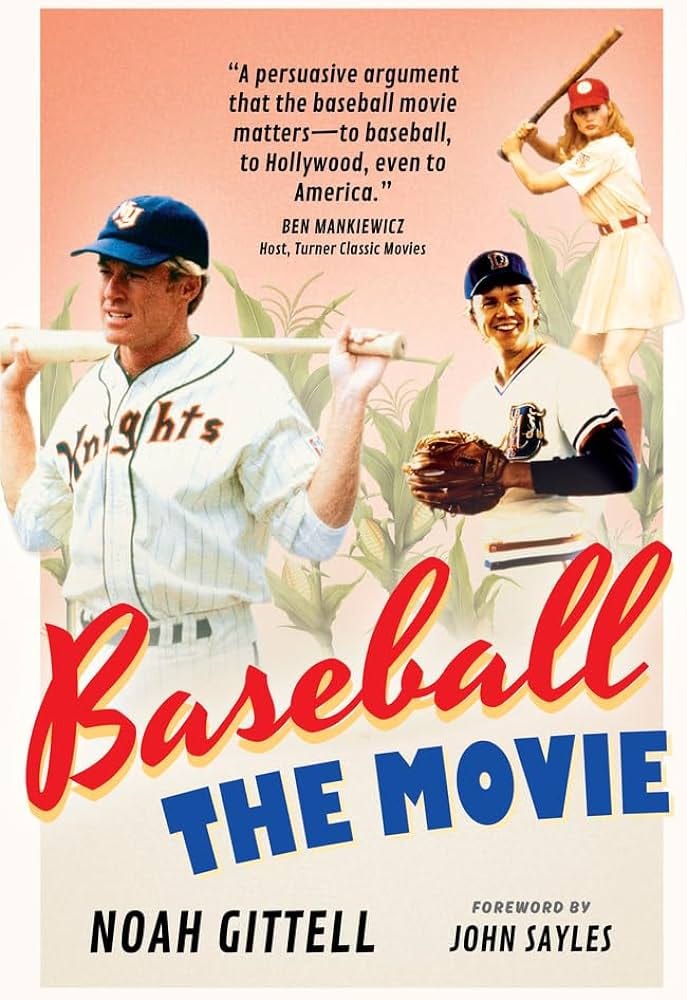
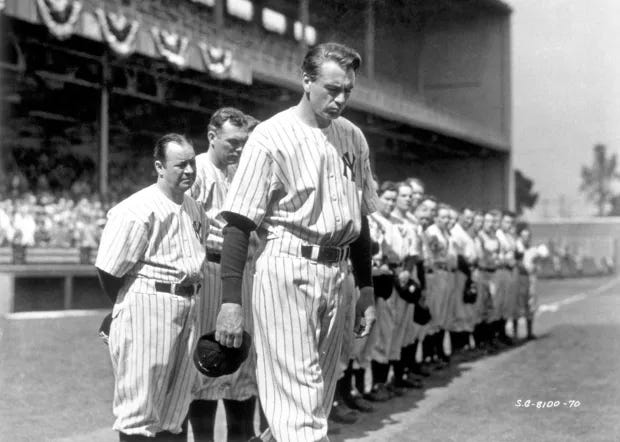
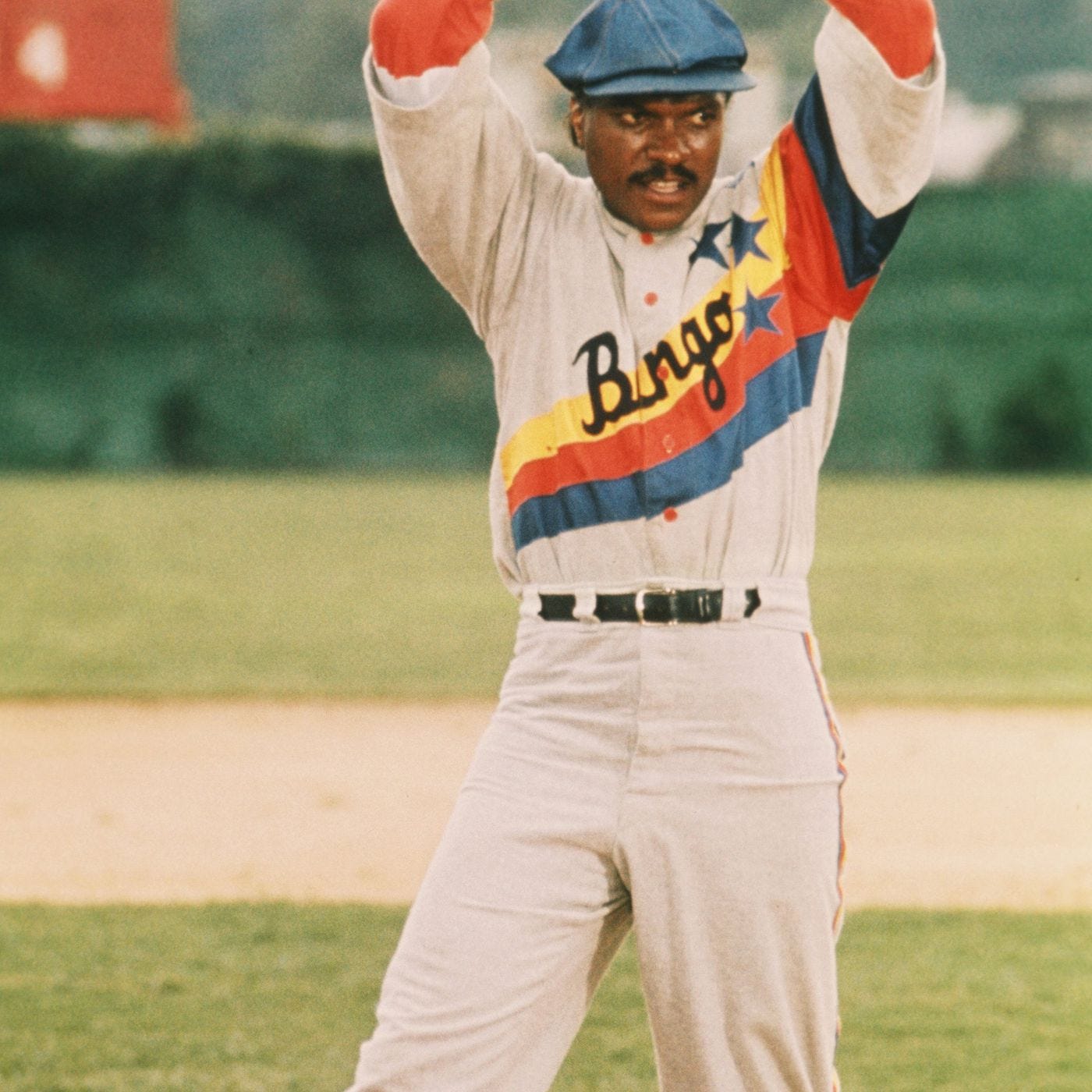
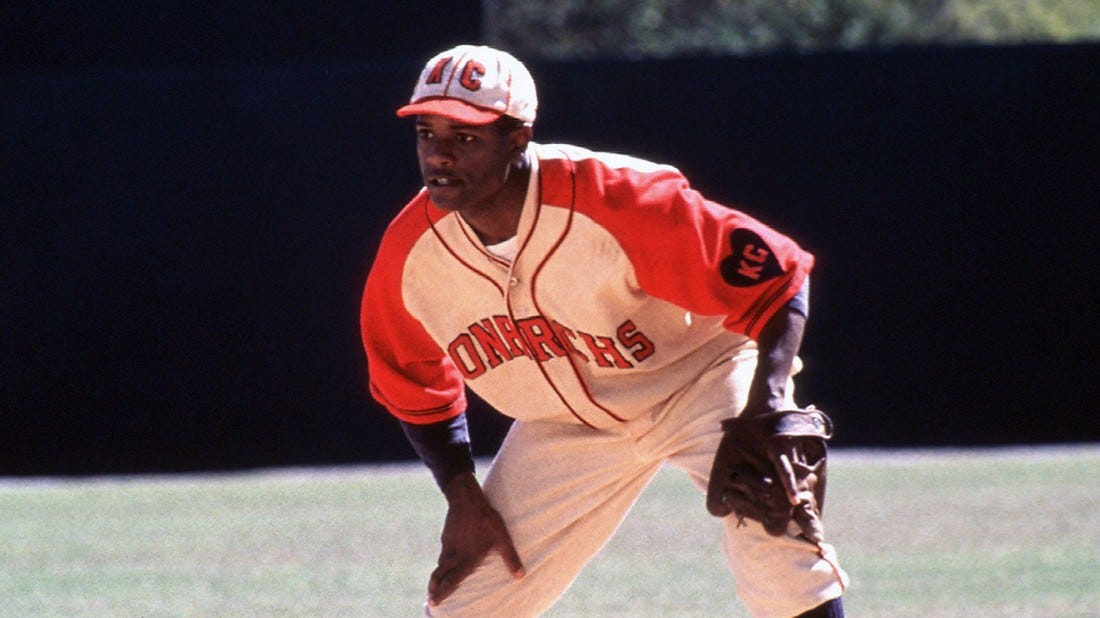

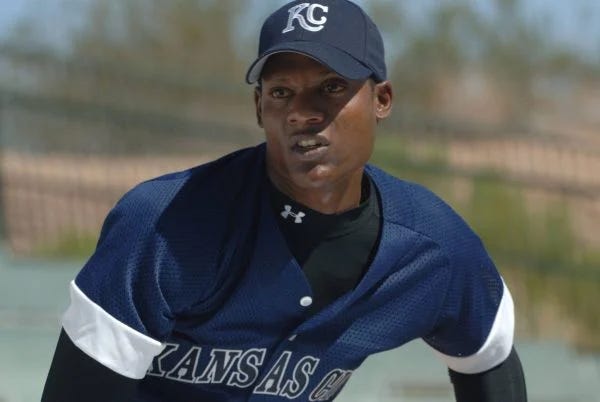

What a comprehensive and articulate take on both baseball and movies! I feel informed and moved.
Another keeper!
Thanks.
I love seeing two of my favorite Substack creators interacting! Thanks so much for this fantastic interview!